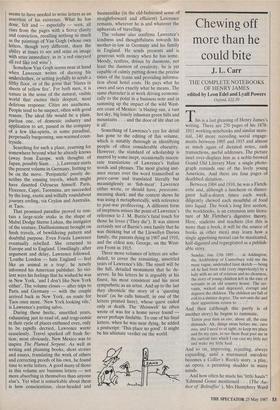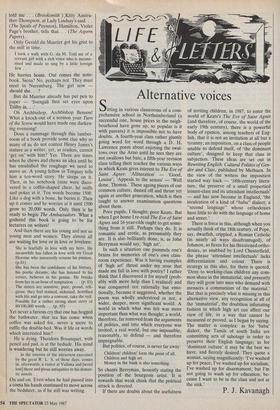Chewing off more than he could bite
J. L. Carr
THE COMPLETE NOTEBOOKS OF HENRY JAMES edited by Leon Edel and Lyall Powers
Oxford, £22.50
This is a last gleaning of Henry James's writing. There are 250 pages of his 1878- 1911 working-notebooks and similar mate- rial, 140 more recording social engage- ments between 1905 and 1915 and almost as much again of dictated notes, cash transactions, useful addresses. The picture inset over-displays him as a noble-browed Grand Old Literary Man: a single photo- graph reminds one of the lively young American. And there are four pages of deathbed dictation.
Between 1904 and 1910, he was a Fletch- erite and, although a luncheon or dinner- guest half-a-dozen times each week, diligently chewed each mouthful of food into liquid. The book's long first section, the workbooks, is an extension into litera- ture of Mr Fletcher's digestive theory. Here, students and teachers (for this is more than a book; it will he the source of books in other men) may learn how a single appetising morsel can be masticated, half-digested and regurgitated as a publish- able story.
Sunday, Jan. 12th 1895 . . . at Addington, the Archbishop of Canterbury told me the mere vague, undetailed faint sketch — being all he had been told (very imperfectly) by a lady with no art of relation and no clearness, the story of young children left in the care of servants in an old country house. The ser- vants, wicked and depraved, corrupt and deprave the children. The children are full of evil to a sinister degree. The servants die and their apparitions return to . . • ,'
And then (although this partly is of another story) he begins to ruminate, Terror pew bien en erre, above all, the case demands. Ah, things swim before me, taro mio, and I need to sit tight, to keep my place and fix my eyes, to see them float past me in the current into which I can cast my little net and make my little haul . . .
And so on, improving, rejecting, always expanding, until a murmured anecdote becomes a Collier's Weekly story, a play, an opera, a persisting shudder in many minds.
And how often he made his 'little hauls'! `Edmund Gosse mentioned . . . (The Au- thor of 'Beltraffio' ), Mrs Humphrey Ward told me . . (Brooksmith ) ,Kitty Anstru- ther-Thompson, at Lady Lindsay's said.. . (The Spoils of Poynton), Hamilton, Violet Page's brother, tells that. . . (The Aspern Papers).
Only Gerald du Maurier got his grist to the mill in time.
I took a walk with G. du M. Told me of a servant girl with a rich voice who is mesme- rised and made to sing by a little foreign Jew . . .
He hurries home. Out comes the note- book. Siena? No, perhaps not. They must meet in Nuremburg. The girl now should she. . .?
But du Maurier already has put pen to paper — 'Svengali first set eyes upon Trilby in. .
Oh Archbishop, Archbishop Benson! What a knock-out of a sermon your Turn of the Screw would have made one darken- ing evensong!
Does a rummage through this lumber- room of a book provide some clue why so many of us do not contest Henry James's stature as a writer, yet, as readers, cannot `get on' with him? Yes. There are times when he chews and chews an idea until he has emulsified the roughage we need to move us. A young fellow in Torquay tells him a ten-word story. He sleeps on it. Then, in his notebook (nine were disco- vered in a coffin-shaped chest, he sniffs and pokes at it. Ten words become 1500. Like a dog with a bone, he buries it. Then up it comes and he worries at it until 1500 grow to 20,000 words. Only then is he ready to begin The Ambassadors. What a godsend this book is going to be for lecturers on writers!
And then there are his young and not so young men and women. They almost all are waiting for love or in love or lovelorn: She is fearfully in love with my hero. He meanwhile has fallen in love with my Good Heroine who innocently returns his passion. (P.81)
She has been the confidante of his literary, his poetic dreams, she has listened to his verses, believes in his genius. He breaks from her in an hour of temptation . . . (p. 83) The sisters are sensitive, pure, proud, reli- gious: they feel stained, sickened, horrified with life and go into a convent, take the veil. Possible for a rather strong short story of 80/100,000 words . . .(p. 85)
Yet never a furious cry that one has hogged the bathwater, that tea has come when coffee was asked for, never a snore to ruffle the double-bed. Was it life or words which interested him?
He is dying. Theodora Bosanquet, with pencil and pad, is at the bedside. His mind is wandering but he still worries away.
. in the interest of the attraction exercised by the great R. L. S. of those days, comes in, afterwards, a visitor at Vailima and [word lost] there and pious antiquities to his domes- tic annals . .
On and on. Even when he had passed into a coma his hands continued to move across the bedsheet, as if he still was writing.










































































 Previous page
Previous page